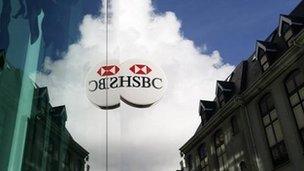HSBC profits almost double to $8.4bn as bad loans fall
- Published

HSBC is confident about future growth in the US and China
HSBC almost doubled pre-tax profits to $8.4bn (£5.4bn) in the first three months of 2013 after trading conditions in the bank's key markets improved.
The rise, an increase of 95% on the same quarter in 2012, came as HSBC reported a big fall in losses from bad debts and provisions for other risks.
Loan impairment charges fell 51% to $1.17bn, with the fall most notable in the US, HSBC said.
Chief executive Stuart Gulliver said the US would continue to strengthen.
In China, after a slower start to the year, Mr Gulliver said he expected the economy "to accelerate" during 2013.
Cutting costs
Since taking over in early 2011, Mr Gulliver has been trying to streamline operations, reduce complexity and cut divisions that are unprofitable. HSBC has sold or closed 52 businesses since he became chief executive.
"We have strengthened our capital position and remain one of the best-capitalised banks in the world, allowing us both to invest in organic growth and grow dividends," the company said in a statement.
In March, HSBC, which has eliminated about $3.6bn of costs, said there was room for a further $1bn in savings this year.
Costs in the first quarter were down 10% from a year ago, and now consist of about 53% of income. The bank is aiming to get the percentage below 52% by the end of the year.
Across Europe, smaller rivals are also cutting back, with French banks Societe Generale and Credit Agricole on Tuesday saying they must keep cutting costs to help offset a weak domestic economy.
Richard Hunter, head of equities at Hargreaves Lansdown Stockbrokers, said: "Set against a mixed bag of trading updates so far from its peers, HSBC has delivered a statement which not only ticks all of the boxes, but propels the bank to premier status in the sector."
The profit figures were higher than many analysts had forecast, and HSBC shares were up almost 3% in afternoon trading.